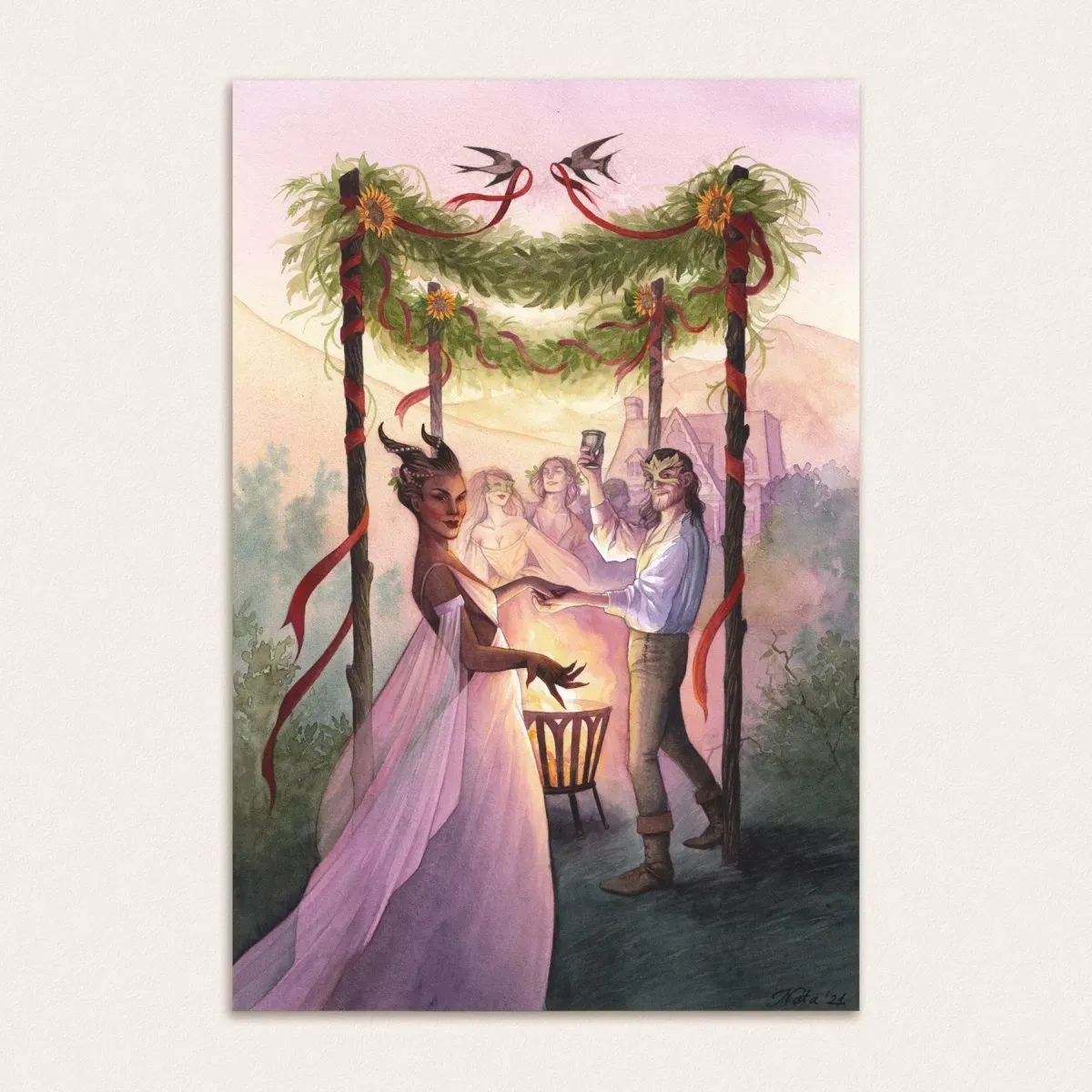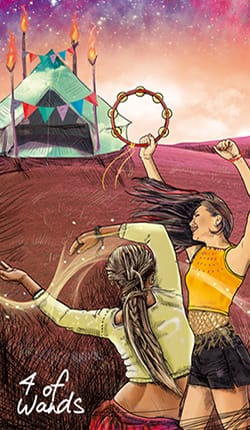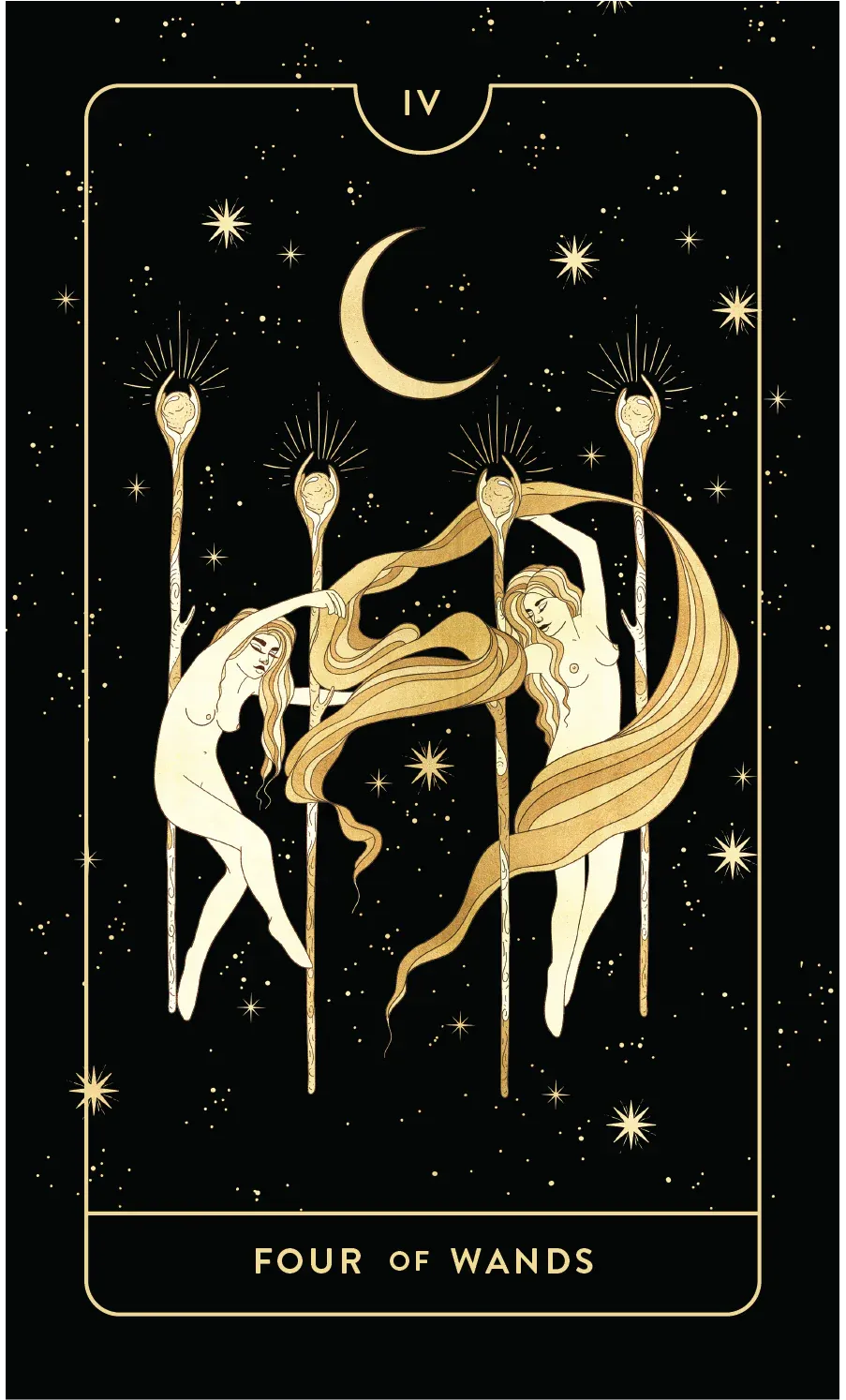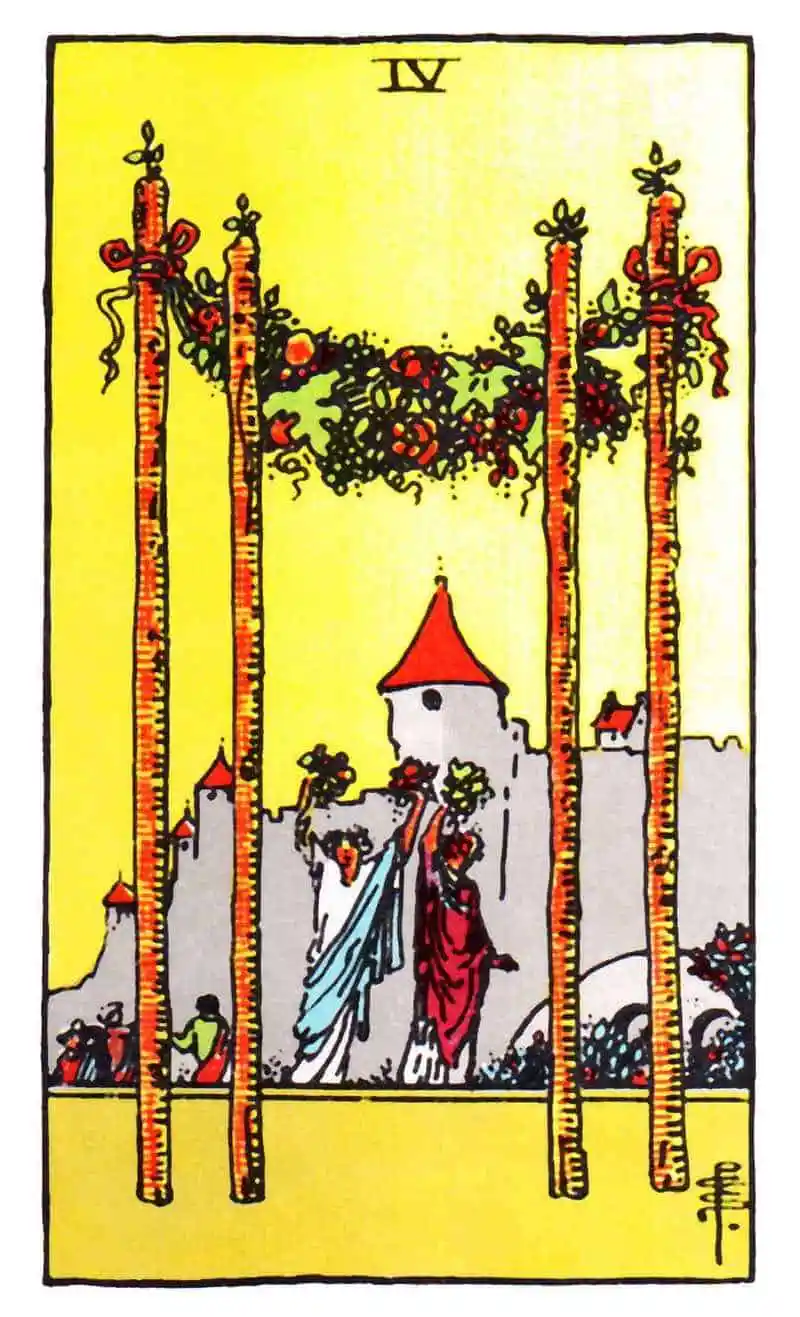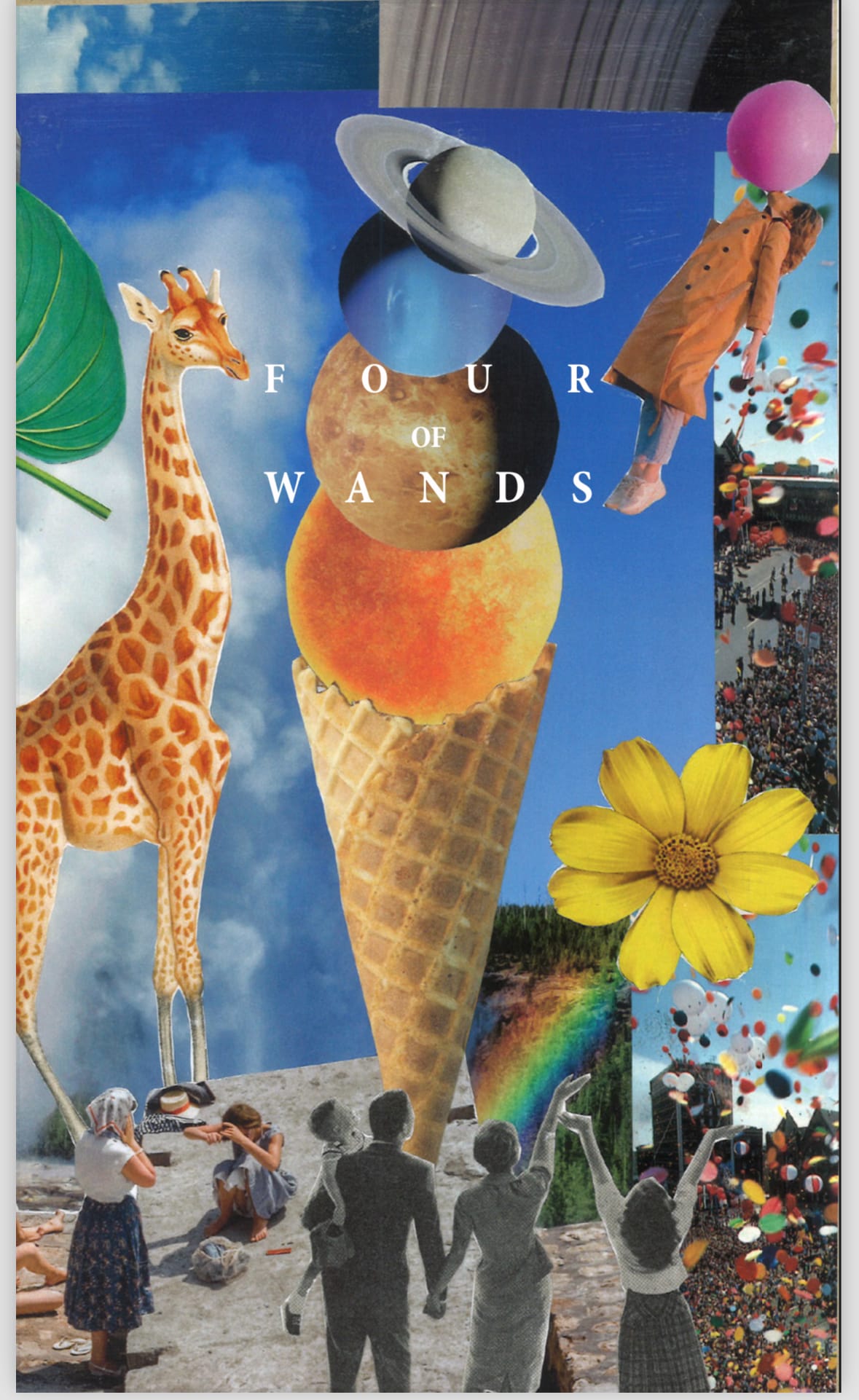Four of Wands
A conversation with chef, Natasha Feldman, about the transformational magic of dinner parties.
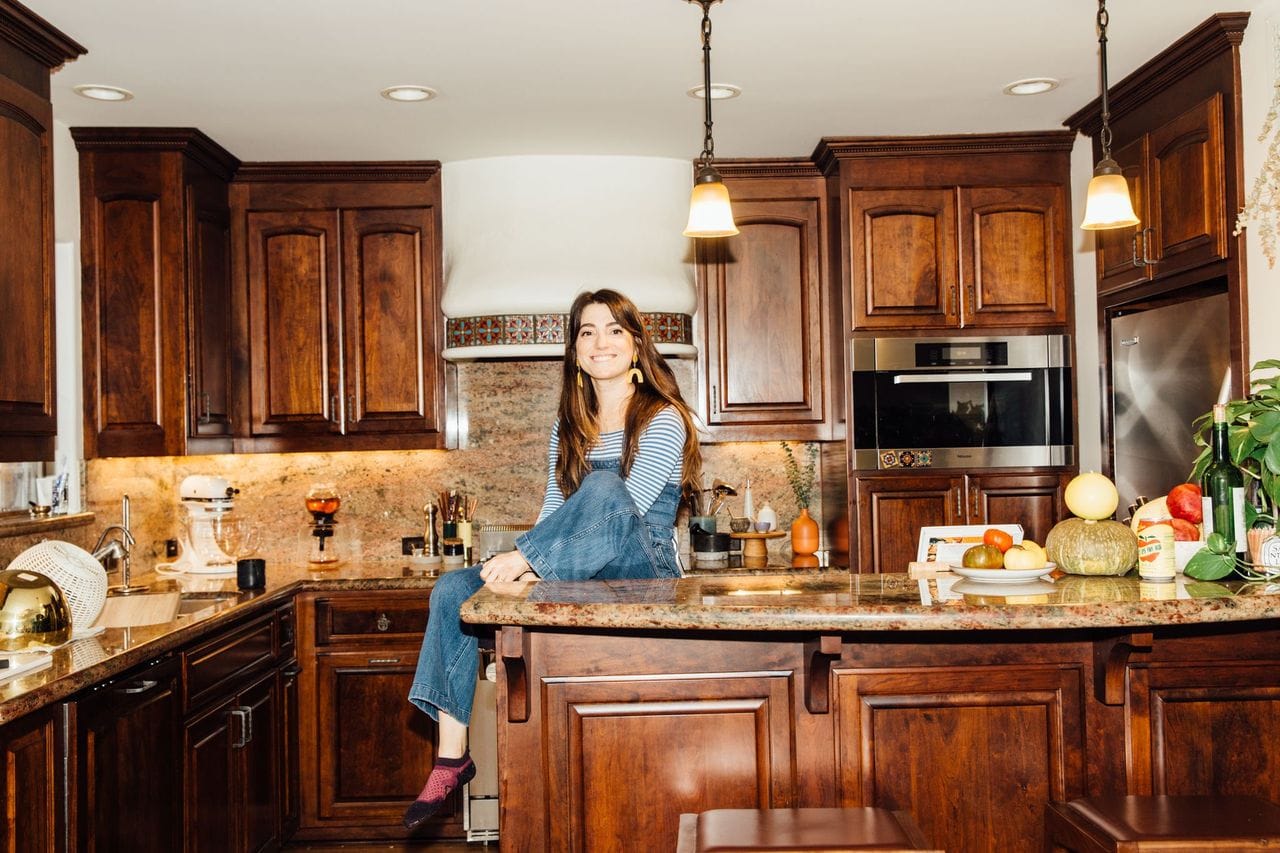
Four of Wands Playlist
The Four of Wands is a joyful card that symbolizes a cozy and happy home, and invites you to celebrate. This is a card about celebrating love, comfort, and family, and from the beginning of this newsletter, I knew exactly who I should talk to about this card.
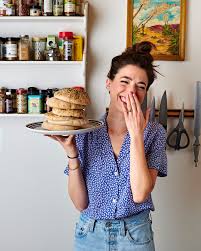
My friend, Natasha Feldman, is a chef, author, host, party enthusiast, passionate dog mom, escape room fan, and a million more things. Natasha is the author of Dinner Party Project, hands-down the most used and beloved cookbook in my home. I highly recommend following Natasha on instagram, and subscribing to her newsletter, Gluteus Minimus, where she creates, tests, and shares the best gluten free recipes (Tash was diagnosed with an auto-immune disease after publishing her cookbook and learned she needed to go completely gluten free – a challenge for a chef, as you can imagine!). I am not gluten free and I have eaten many of these recipes and I'm telling you, they are ding-dang delicious.
Natasha's Dinner Party Project is a celebration of the magic of breaking bread with friends. I have been the well-fed recipient of that magic on many occasions, and in this interview, Natasha and I discuss what parties and celebrating look like now that I don't drink alcohol. We also talk about the best wedding I've ever been to (Natasha's), what makes a party truly fun, and why you should think of your party as a tech start-up.
Fun fact: I gave Natasha the tarot deck that I made and she called me to ask about her favorite card in the whole deck – "What is the Four of Wands all about?" she wondered. I said, "Oh my God, Tash, the four of wands is you."
I hope you enjoy this conversation as much as I did.
Eliza: Well, thanks for talking to me about celebrations. You're the perfect person to talk to about this, because you are one of the best hosts I know, and you've written a whole book about it, which we'll talk about. Don’t worry.
Natasha: Dinner Party Project. It’s eight dollars on Amazon right now. So, it’s a great time to buy.
Eliza: Everyone should buy this book. It’s my favorite cookbook hands down. So the 4 of wands is a card that's about celebration, ritual, and parties. It's also about coziness and home. In The Rider Waite Colman Smith deck, which is probably the most famous Tarot deck, the image is of two people standing beneath this beautiful canopy, or a chuppah. It feels very much like a wedding. What is the best party you've ever thrown?
Natasha: I did a New Year's party when Andy [Natasha’s now-husband, then boyfriend] and I were living downtown. I made a standing rib roast and went full 1970’s Ruth’s Chris Steak House. Everybody’s expectations of coming to Andy’s New Year’s Party were that we were gonna eat like tinned popcorn and drink alcohol that had been sitting out in the sun on their bar for five years. So, coming into a house that smelled like a holiday and being served a feast with people that didn't know each other, but that were excited to meet one another… There were all different types of artists, creative downtown people who were excited to meet each other anyways... the expectations were so low, and then we were able to so over deliver… the amount of happy that it made people was so memorable. It was just the expectation versus the reality. Such a fun surprise! And a cool way to start the New Year.
Eliza: What do you think makes a great party?
Natasha: Your attitude as a host.
Eliza: Oh! Tell me more!
Natasha: You can have mediocre pizza, and wine from a box, but if you're in a good mood, and everybody has a drink, and there's toilet paper and paper towels, and no one's confused about where things are… that can be just as fun of a party, as, y'know, like spending $10,000 on the thing.
If you are the most inviting version of yourself, and having a good time, that makes the difference. I've been to people's houses where everything they've done is so beautiful, but their stress levels about everything coming out on time, everything being hot, everybody having a good time, there's so many things on their mind that all you can really focus on is trying to help them, or figure out how to not make them stressed out or overcompensate for what you think is going on in their head. You end up faking having a good time. There's nothing worse than that. That's one of the points of the book.
The number one thing that you can do for yourself as a host is to think about your dinner party as a tech startup. What is the minimum viable product of this dinner party? And then, how many more steps up can I go before I'm stressed out? Aim for one level below that. That could be different day to day. Some day you might have nothing going on and you wanna blow this shit out of the water, and that's fun. Take it one step down and you're gonna be fine. Other days, if you just wanna order Chinese food and cry on the couch with friends and beer, that can also be fun as long as it was what you were expecting.
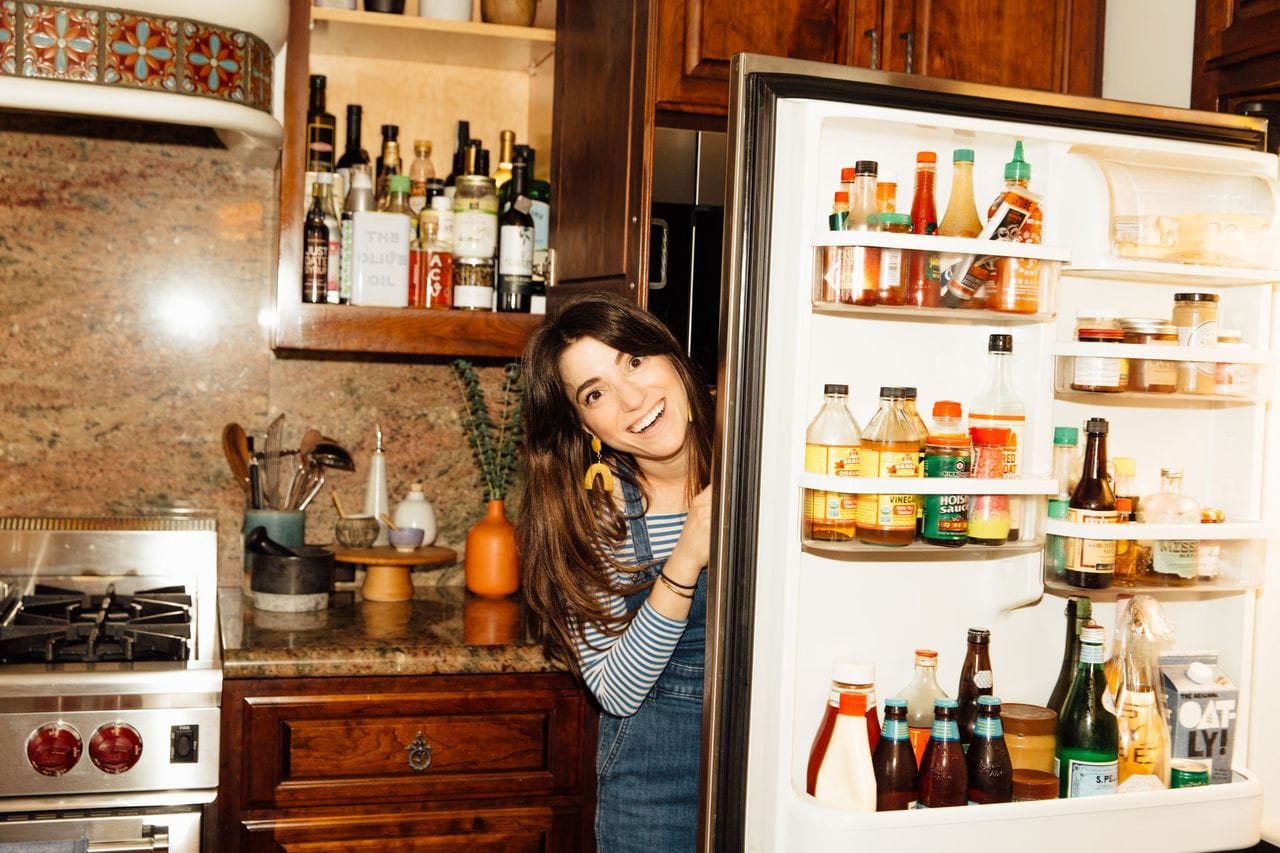
Eliza: Would you consider yourself a people pleaser?
Natasha: I think it depends on the day.
Eliza: I ask because I definitely consider myself a people pleaser. I really love hosting parties. I love it. However, since I quit drinking, my relationship to parties and to hosting has changed, and I’m still trying to figure out what my capacity and desire to host actually is. Rather than trying to remain at the level of party that I used to give, which was in large part an excuse to drink, I’m trying to figure out what I actually enjoy doing. How do I figure out what kind of party I want to have? What do I do for my 40th birthday next year, for example?
Natasha: My first question would be: what do you think is the difference to the people coming to your parties now versus when you were drinking? Does anybody but you notice a difference?
Eliza: I don't think anybody but me notices a difference. I think that I enjoy it less, though.
The best party I've ever thrown was the party that I threw on the second anniversary of Covid lockdown. I called it Human Connection: The Party. It was all women, and everyone brought an item that “got them through” the last two years. Some people brought a book that changed their life, or a tin of weed gummies, or a deck of tarot cards, etc, and then everyone left with something that someone else had brought. There were also performances and essays that people read. I loved that party. It was incredibly intentional, but it took me a lot of time to think it up. It was an enormous effort. I'm trying to figure out what kind of host I am now, or maybe what is worth celebrating. I guess I don't know. I don't know if you have an answer…
Natasha: So do you feel that the party has to have a center, and the center used to be drinking, and now we don't know what the center is? Is that kind of the question?
Eliza: Yes, maybe. I think maybe what I used to love was having as many people that I loved as possible, and then I would sort of drink and flit about from person to person. I have less social capacity than that now that I’m not drinking. I’m no longer anesthetized.
Natasha: It takes 10,000 hours to get good at something. Throwing parties and cooking are very much one in the same. Instead of thinking about it as I want this to be the perfect party, think of it as I’m gonna try something, decide what I liked and didn’t like, and then try something else. If you continue doing that you’ll eventually hit on something that works. You might think that you're really gonna like something, and then in practice, you are like, Oh, no, this wasn't for me.
My favorite dinner party is one that's small enough that we can eat great food and then play a stupid game, because, you know I love games. So, that would be about six to eight people if you’re gonna play a board game, or more if you’re playing charades or whatever. Maybe it’s not everybody's favorite activity, but once you're actually doing it, I think people have a really good time. Or you make an environment where you play something that's fast, and then some people leave earlier than others, but I think it's about figuring out what it is that's most fun for you. And then people see you enjoy yourself, and it frees them up to enjoy something that they might not otherwise. That’s one of the best things about dinner parties. We get so stuck in the things that we think that we like and the people that we think that we are, but going home after being challenged in some way is fun. And it’s really low stakes. This is good for us as semi-formed adults.
Eliza: I totally agree with that. I've never thought about it that way. But it's true. My own taste for parties has changed from wanting to be in a crowd to being a bit more intimate. I like a six to eight person dinner party. I have always had people from all different parts of my life at all my parties and I always feel like it’s going to be amazing. And listen, generally speaking, it is amazing. I have friends who are all willing to get out of their comfort zone and meet new people, but when you are the person who connects everyone at the party and you’re a people pleaser, you can spend a lot of your party doing a vaudeville act.
Natasha: I feel like thirty-five years of my life was a vaudeville act.
Eliza: I am retiring from vaudeville, but at age thirty-nine.
Natasha: So I think one of the things to ask yourself is: what is the point of my party? I like to think of my parties as a thing I can do, in my own little way, to make my community healthy and better. I enjoy introducing people to new things and new people, because, like I said, we get stuck in our own echo chambers and social groups. When you invite new people with new ideas or you try out new activities, it starts to break down those strongly held beliefs that we cling to based on basically nothing. At the end of that kind of party, you feel so light and free. It helps your brain stay elastic. Before the pandemic, we were doing this thing called Friendsday Wednesday. We had a Google sheet, and you would just put your name in to come to dinner. Some weeks, it would be a quiet dinner, and you would talk about two things at length, and then other times, it was a boisterous gathering and everybody’s screaming. It’s good for us to be in situations that occasionally feel awkward. I personally always feel like I have to fill in every gap in the conversation, and if I don’t fill it, it’s going to be awful and it’s my fault. But actually, there are five other people here. Anybody could say something. It’s stupid for me to feel like it falls on me. Every time I remind myself of that, and I sit back and wait to see what happens, it breaks down the neurological pathways that tell me that there’s only one way something can happen. Being with Andy has helped a lot with that, because he can sit there and not say anything for five hours. It doesn’t mean he’s mad or he doesn’t like you. He’s just in his own head, having a good time.
Eliza: I, too, am married to a Quiet Man™.
Natasha: It's fucking annoying sometimes! The confidence!
Eliza: I find it annoying, because I'm like, could you please help me here cause we have to fill the silence (I also feel that way like I have to fill every fucking silence)!
Natasha: Yeah. And he's like What? Someone will say something when they have something to say. For me that’s like Oh, it hurts on the inside. One of the things that I practice with my therapist is sitting back. Remove yourself from the equation and sit back and watch what happens. Almost pretend you’re not there, and turns out, the thing will go on, you are not the center of the universe. Dinner parties and parties in general are one of the only times when we’re not so caught in our cyclical behavior, and we get to play in a new space. Practice new ways of being.
Eliza: Play is a great word to talk about with the Four of Wands. As adults, we have very few opportunities for play, which is sad. Play is part of what makes a joyful life. Every time I’m forced to do anything social, I’m miserable at the idea of having to leave my home. Just miserable. But as soon as I get there, I’m thrilled to be there and I’m so glad I went. But there is a huge barrier for entry for me, I don’t know what my problem is.
Natasha: You’re comfortable. You’re experiencing inertia. You want to continue to keep doing the same thing. You have to work to divert yourself into something else.
Eliza: Totally.
Natasha: And then you're like, Oh, I don't want to do the work, my brain's already tired, I already did this, what if I have nothing to say! But the more times you challenge that, the better you become as a humanoid.
Eliza: I was just at my grandmother's funeral recently. She lived to be 98, and she was totally sharp and social until the very end. At the funeral so many people were talking about how social she was and how she was incredibly interested in people of all ages. She remained interested in learning her entire life, and she was a real social butterfly. I think that’s part of what kept her alive for almost a century.
Natasha: They say that statistically loneliness is as bad for you as a pack of cigarettes a day. As we continue to become more of a global society where you feel like you're interacting with more people because they're on a tiny screen, you can get sucked into your own little cocoon.
Eliza: Totally. The illusion of having interacted when you actually have not interacted with an actual human in the flesh.
Natasha: Every day it feels like we’re in a competition with the whole world, comparing yourself to everyone else’s best version of themselves that they want to show on the internet. It’s exhausting.
Eliza: I think about this all the time. You're a person who has to spend at least some of your day online because that’s part of where your work is. How do you deal with that without going insane?
Natasha: Well, I unfollowed a lot of people. I only follow people whose content I find uplifting, interesting, fun, or funny. I used to follow a lot of news sources because I wanted to be up on what was going on all the time. But I’ve unfollowed every news source. I feel good getting my news sources from NPR and Crooked Media, and that’s what I can handle. I want my information to come from experts. Online, I want to see what people love, what motivates them, what they’re excited about. I like to learn about and see other parts of the world and challenge myself with what kinds of food I’m making. I really focus on using social media as a food tool, staying in that lane. The only time I strayed from that was to do my Vote Save America bake sale. When Biden was the nominee people, I was frustrated that so many people seemed so disengaged and disillusioned and the Internet fervor seemed to make it seem like it was okay to sit it out because “they’re both bad choices.” My personal feeling about that was that there could not be two more different choices. While everyone was feeling this general malaise, I was getting angry. I felt like I needed to do something to motivate people to start caring, because so much of political campaign funding has to happen early so they can strategize and actually make a difference. So I reached out to Vote Save America, because I love Crooked Media, and I said, “Hey I want to do this bake sale and get you the money. I know you’re a PAC now, how do I do that?” And they said, “We want to do it with you.” So, we partnered on it and hosted a giant bake sale and raised a bunch of money for them. It was so hard to get anybody to want to match donations, or to get any celebrities on board. Everybody was so nervous about being politically involved. Now that we have a new candidate, it’s a totally new world.
Eliza: You have to do another one.
Natasha: But the truth is: the stakes are still the same.
Eliza: You’re absolutely right. Honestly, you knocked some sense into me. I was obviously not going to sit out the election, and I’m sure I would have done a little bit of volunteering nearer to election day, but I was pretty disengaged and disillusioned, which is crazy, because no matter what you think about Biden, and there are plenty of things I disagree with him about, he has been one of the most progressive and consequential presidents in my lifetime. And so when we talked about your bake sale, you snapped me out of my funk. I was like, “WHAT THE FUCK AM I DOING HERE?” So obviously, I bought an enormous number of pastries. And I’ve been engaged ever since.
Natasha: To sort of tie this back to dinner parties: my general ethos is that I like to be challenged. I want to have people with differing opinions over for dinner. When we challenge our brains, when we hear other people’s considered perspectives, that’s when you really are able to hold multiple truths at the same time, that’s when you can begin to understand the nuances of our political environment and focus on problem solving, focus on trying to mold the world into a better version of itself.
Eliza: Well, Internet culture to me feels very much about broadcasting morality and not actually doing a lot. I like your approach to social media as a way to have fun and connect, and then in your real life, you are doing what you can to make the world a more just place for everyone. The Internet can make you think you’re doing something when you’re actually doing nothing. Amplifying your own political beliefs to people who agree with you.
Natasha: I like having a political conversation in person, but I don’t think we get anywhere when we try to have these conversations online.
Eliza: Okay, pivoting away from politics and back to the Four of Wands: What role does ritual play in your life?
Natasha: Well, I’m Jewish. In Judaism, in an Ashkenazi reform Jewish family that doesn't really identify with the religious aspects of Judaism… Judaism really is about getting together and eating food, eating food that you know you're gonna eat, being excited about those things and those events being like markers of time. Some people do Shabbat, which is dinner every single Friday night to denote the week going into the weekend, and you talk about, y'know, what you did well, what you didn't do well, how you want to be a better person in the next week. Each week you have this check in that doesn't have that much to do with religion, but it’s built into Judaism. I don't do Shabbat dinners, but I feel like dinner parties are the secular Shabbat.
Eliza: You probably do dinner parties as often as a person who hosts Shabbat.
Natasha: Totally, though it’s not always on a Friday. And we don't light candles…
Eliza: You light candles. I’ve been to dinner at your house.
Natasha: Yeah, that's a great point.
Eliza: It might not be done in a ritualistic way, but there are definitely beautiful candles.
Natasha: My husband, Andy, and I watch TV and eat dinner almost every night. It's like our thing. That’s it’s own little ritual. When you have people over or you go to someone's house, and you're engaging and thinking, marking time… Dinner parties are my version of that tradition. Religious traditions often happen at the same time every single year with the same foods. I like knowing that I’m gonna have people over. In the book, I talk about starting a dinner party ritual— maybe once a month — You start with your minimum viable product and then challenge yourself when you feel like it. Don’t challenge yourself when you don’t feel like it. It’s hard to be like, whoops, I forgot to do Passover, because you’ve been doing it for thirty-seven years. I think if you get in the habit of dinner parties on a regular basis, it becomes ritualistic in a great way.
Eliza: You have a few parties that you host annually.
Natasha: Chili cook off!
Eliza: Let’s talk about it.
Natasha: Chili cook off is a party where everybody brings a pot of chili that they’ve made. They usually have funny names and you can win awards. Most unusual chili, best chili, best non-chili item, best chili name. So maybe you’re not the best at making chili, but maybe you’re very funny. There’s a prize for everyone.
Eliza: What's an example of a funny chili name?
Natasha: I was particularly fond of Chili con Barney, Chiline Dion “my fart will go on," and Chilamos! Let the rhythm take you over.
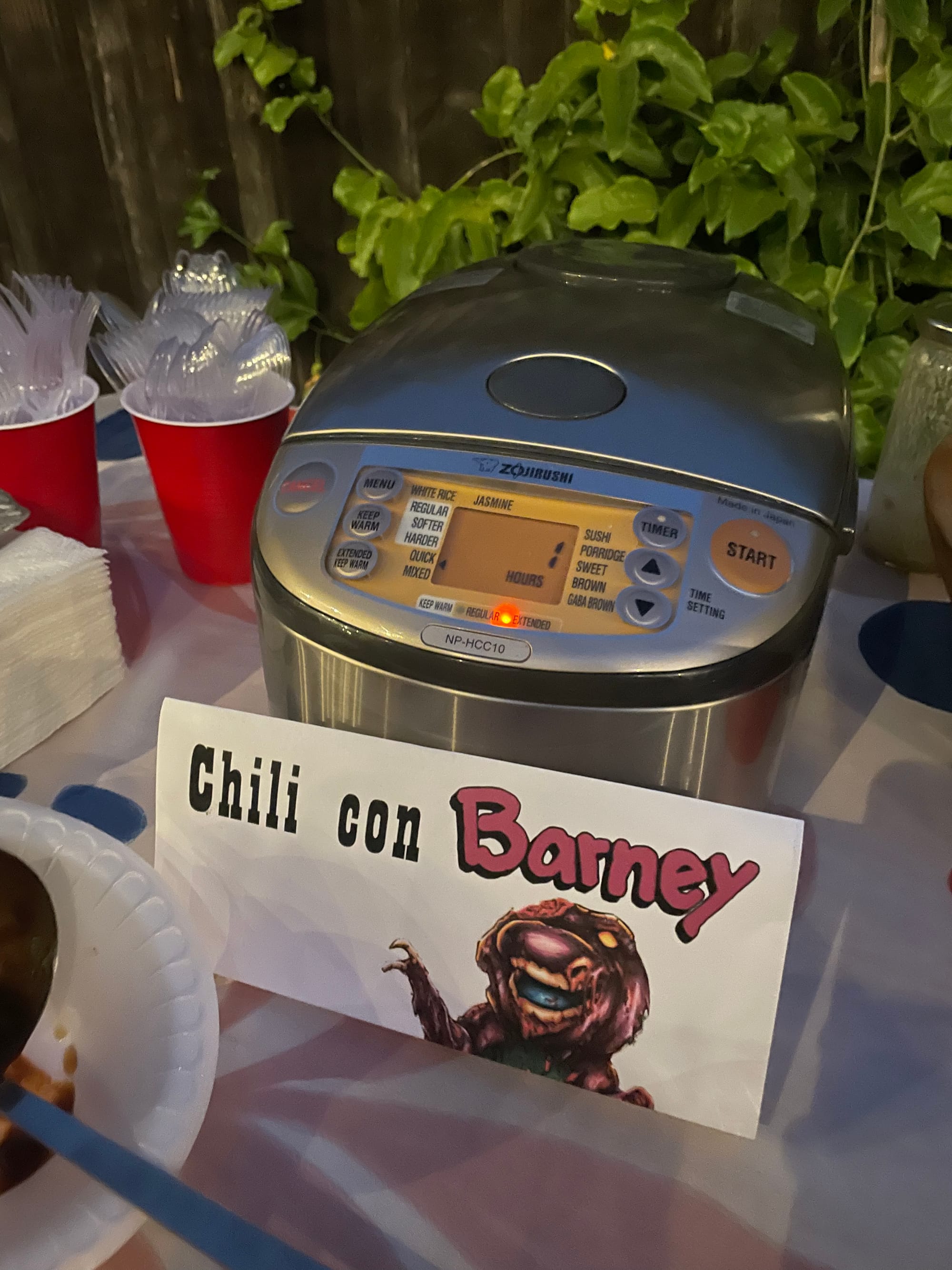
Eliza: How did the Annual Chili Cook Off start?
Natasha: It’s Andy’s party. He started it before me, and then after we started dating, I got in on the action.
Eliza: As you are embarking on a fertility journey (this is something you've talked about on your instagram page), what’s one tradition from your childhood that you’d like to continue. And what’s a tradition or ritual that you’d like to start?
Natasha: When I was a kid, if I was gonna have dinner with a friend, it was always at my house.
My mom did a dessert every night, and was a pretty good cook, and my parents were fun, they didn't really care what we were doing, they just wanted us to be safe. People like loved coming over for dinner, and we had friends over for dinner sometimes multiple nights a week. I loved that my house was the center of that kind of gathering.
That’s something that I would really like to maintain, having the house that always has good snacks, the house everyone wants to come to because the snacks are great. My parents didn't really have their friends over when I was little, they would always go out to eat if they were seeing friends. But I like the idea of getting kids involved in dinner parties when they’re old enough. I was separated from adult parties but I think there’s a lot for kids to learn from being in that environment. I don’t have kids yet, maybe it’d be fucking impossible. But when we had the last dinner party at your house, Graeme came to the table, and we fixed her a little plate, and she was hanging out. Moments like that are really fun, and they’re also good for us adults, you get to mark the passage of time. You get to see kids that aren’t your own. And I think she enjoyed it. Making that a meaningful decision, to include children in gatherings, I think, will be something I would like to do.
Eliza: I love that. I also love having the house where kids like to come for great snacks. We have our neighbors over for dinner like four times a week. My parents are great, I love them very much, but they keep almost no food in their house. Perhaps because of that, I am a person with an extensive snack cabinet. I will never go hungry. There will be snacks for days. If there’s an earthquake, make your way to my house.
Natasha: I’m curious to watch your evolution as a host. Do you have a dinner party you’d like to try?
Eliza: I really enjoy parties with intention. Recently, I threw my daughter’s tenth birthday party. It had an astrology theme. The kids all dressed as their zodiac sign, and we made spell jars. It was incredibly fun. I think I’d maybe like to host that same party for adults. Before I let you go, can we just talk about your wedding for a second? Because besides my own, it was the best wedding I’ve ever been to. It was such a beautiful, thoughtful experience. We were in Oaxaca, Mexico over multiple days. But unlike other destination weddings, where I imagine it can feel a bit over-scheduled maybe, you gave your guests so many options but not a lot of requirements. You curated a really beautiful, joyful, colorful experience. It was very intentional, beautiful, secular, but sacred. I just loved it.
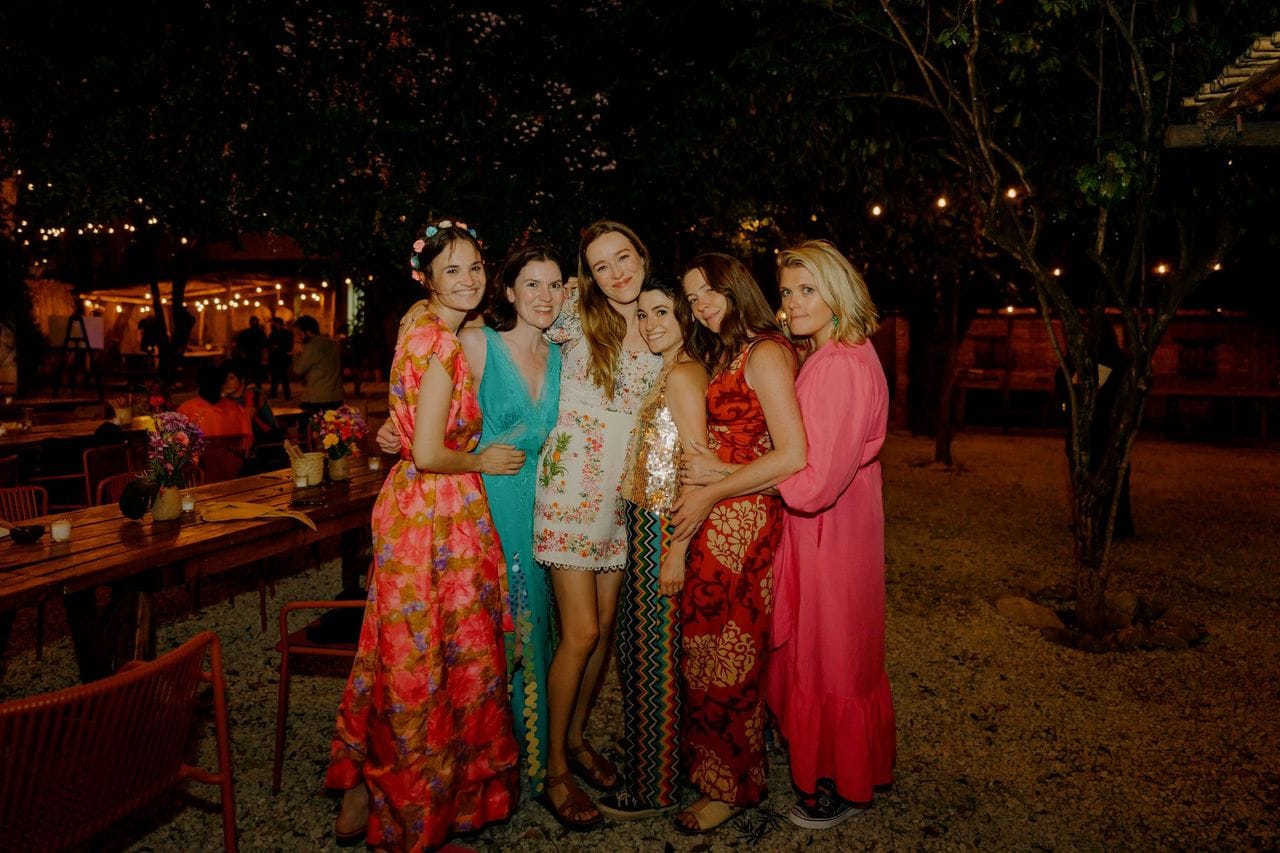
Natasha: Thanks. The idea was: I want to do things. I want it to not be stressful. You can participate in as much or as little as you want. And I wanted people to be really well fed. I wanted to be able to see people for longer chunks of time and not be stressed out. A lot of the magic is in the people that were there, and letting things come together. The guy, Omar, who ran our food tours. I was like, “Omar, take us wherever you want” I relinquished control, I like to let other people have a say. It made it all bigger and better than it would have been if I’d try to control every detail.
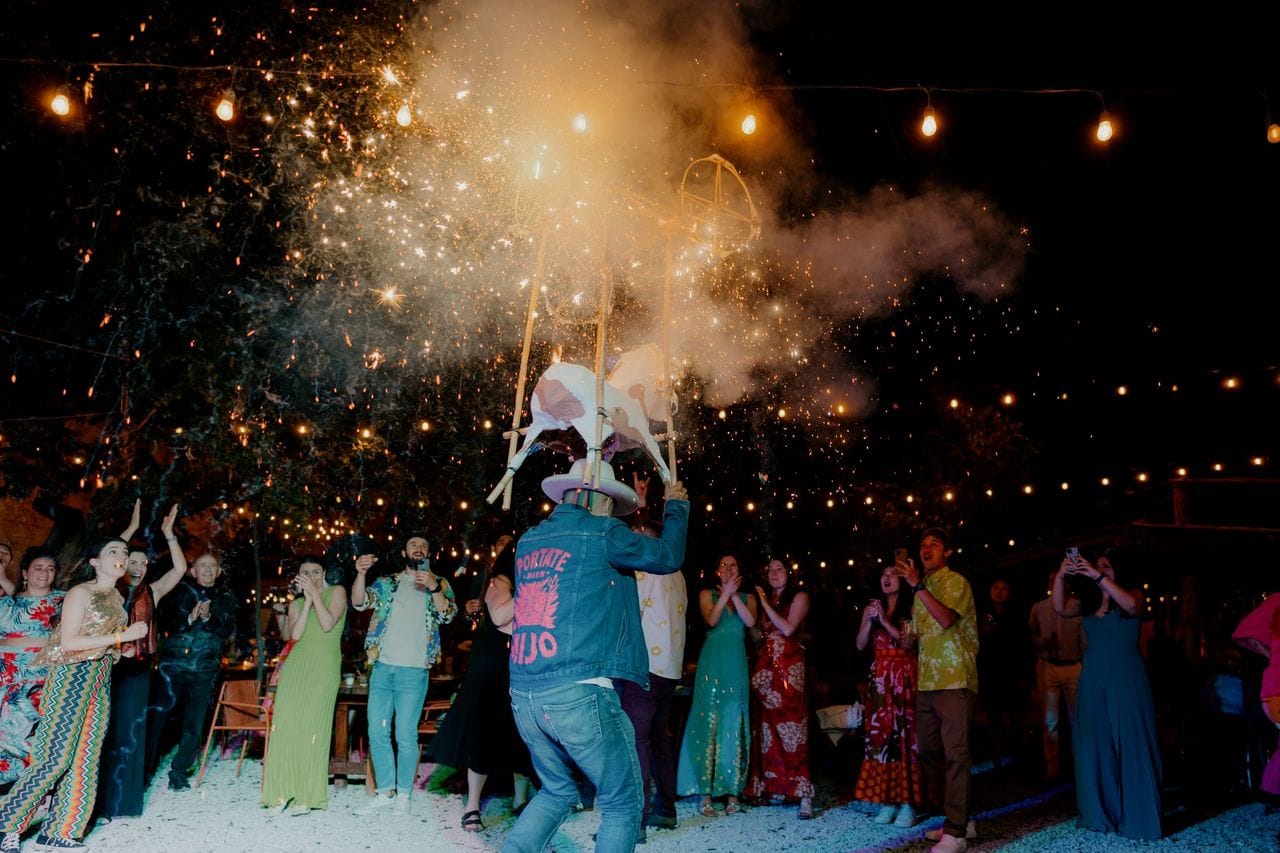
Eliza: Well, and you definitely followed the rule that you talked about earlier. You let people see you enjoy yourself. You planned it well, then you relinquished control. You had fun. It was one of my favorite vacations, honestly, and that’s a crazy thing to say about a wedding. I had an amazing experience, and I think everybody did. And everybody had their own experience, because we chose what we participated in, what we wanted to do.
Natasha: And then you led the five AM hike!
Eliza: Ha! I forgot about that. You and Andy are jokesters, pranksters. There were tons of little easter eggs and jokes incorporated into the wedding. We all got a schedule of events that you could choose to participate in or not. And on that schedule, there was an event I had no knowledge of — something like, “Eli Clark will be leading a 5am witchcraft hike.” There were a number of people who thought that was a real thing that I was going to do the morning after the wedding.
Natasha: And then, at the entrance to the dinner, there was a seating chart, but the only person on the chart was Bobby.
Eliza: Lots of jokes.
Natasha: Part of what made it magical was the mystery. Nobody really knew what to expect.
Eliza: I knew it was going to be great, and I knew the food was gonna be great. But you had also sort of downplayed it a little. You kept saying you weren’t sure you even wanted to do a ceremony. Cut to me crying my eyes out as your dad’s singing Sondheim’s “Being Alive.” Thank you for talking to me about this, let’s party again soon.
